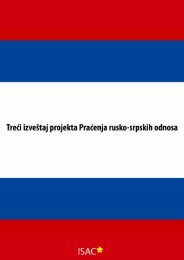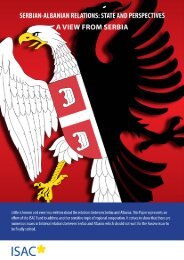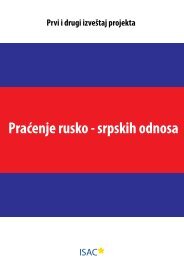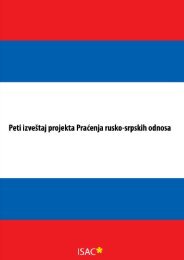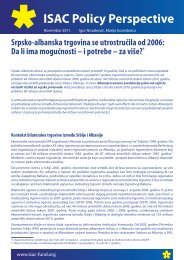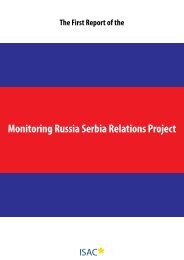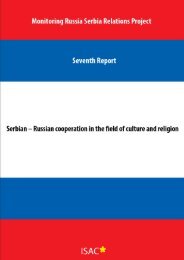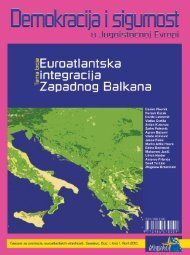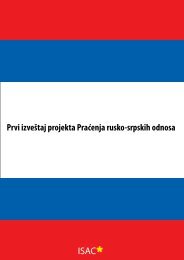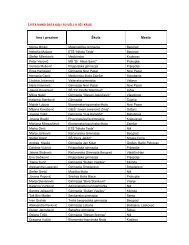importance for the system. It is a single base for relative political stability, a hook whichkeeps the whole political regime. Unlike in 1998 when the system survived very unpopularPresident due to strong Upper and Lower Chambers of the Federal Assembly, nothing cancompensate now for lack of trust to the leader. That’s why not only Putin himself, but thepolitical class on the whole should be interested in keeping Putin’s rating high, which isbecoming more and more tricky due to the crisis and decline in economic prosperity.How Authorities Deal With the CrisisThe government deals with economic crisis in reactive way, acting as a firefighter. Itsactions look mostly logical, although belated in many cases. What is more important to mymind is the absence of any appropriate actions in the political sphere and the sphere ofmanagement.President Medvedev in his State of the Nation speech has criticized the system in a veryharsh way: “Governmental bureaucracy, just as before, as 20 years ago, is governed by thesame distrust to the free individual and activity. Bureaucracy periodically makes business anightmare, so that something will not be done wrong, takes control of the mass media, sothat something wrong will not be said, interferes with the election process, so that the wrongperson will not be elected, pressures the courts, so that the wrong person will not besentenced etc”.Diagnosis made by the President looks well, however the cure prescribed is absolutelyinappropriate. Medvedev’s political package includes decorative changes dealing withpolitical parties and composition of both Houses of the Parliament. They have nothing incommon with the real problems the system is confronted with, including the extremely weakdivision of power both vertically and horizontally, lack of feedback between authorities andsociety, almost complete absence of regional and social groups interests’ representation.There are two different schools of thought: conservers, ‘keepers’ who think that Russiashould just wait for a while before crisis will be over and pre-crisis situation will come back;and ‘doers’ who are claiming for immediate strategic actions, not only to confront the crisisbut to prepare the country for life after the crisis. Not only that the latter are much less innumbers, but they are also divided into two camps: ‘statists’ and supporters of ‘a third way’who are in favor of isolationism and economic nationalism, and ‘liberals’ claiming forinstitutional reforms and broader cooperation with the West. As these liberals are inminority within a minority chances for shifts in this direction do not look real under presentcircumstances.(‘liberal doers’ are in minority among ‘doers’ who in turn are in minority inrelation to ‘keepers’)Who Could Benefit from the Crisis?Among positive consequences of the crisis one can mention the impossibility to continuewith paternalistic model in both state to citizens and center to regions relations. Thus, bothcitizenry and regions although suffering now from the crisis can benefit from it in the end.The regional elections on March 1 were the first vote Russia has held during the crisis. Asthe "war of interpretation" of the election results is in full swing, almost every political partyis claiming victory. The “United Russia” leaders tout the fact that the party won even underdifficult economic conditions in all nine regional parliaments, where elections took place.14
Their opponents point out that not only did the “United Russia” did far worse in everyregion than it did during the 2007 State Duma elections, but it also lost badly wherever theslightest hint of competition existed.The party's losses in the eyes of the public are probably of less significance than its loss ofstatus among the regional political elites. United Russia's greatest setbacks occurred not onlyin major cities with their large -- and less-controllable -- voter populations, but also amongthe Caucasus republics. United Russia on average lost about 10 percent of its usual voterbase, but in Kabardino-Balkaria and Karachayevo-Cherkessia 5 the losses stood at 25percent. That signals the end of United Russia's monopoly among the administrative elite inthe regions.The picture turns out to be more interesting and varied on the municipal level. That is wherecandidates' personal influence plays an even greater role, and the state's rigid control of thepolitical machine is less apparent. United Russia claimed victories in Novosibirsk,Chelyabinsk, Chita, Birobidzhan and Blagoveshchensk, where the incumbent mayors werere-elected by wide margins. In cities where a runoff election is required -- Smolensk,Murmansk, Petropavlovsk-Kamchatsky and Tomsk United Russia's incumbent mayorseither already lost in the first round on Sunday or stand a good chance of losing once theopposition voters consolidate their support for a single candidate in the second round(playoff). In Tver, the Communist Party walked way with a clear victory, bringing in twicethe number of votes as United Russia in the city's legislature. United Russia failed toachieve 40 percent representation in the city legislatures in Bryansk, Ulan-Ude and Tolyatti.In Tolyatti, second place went to the opposition movement December that includesrepresentation from Yabloko and Right Cause.Not only did the participating parties but the entire electoral system passed the test ofwhether it could function under crisis conditions. Although the country is still very muchstruggling with overcoming the economic crisis, it has entered a new phase of politicalactivity.United Russia's weakness, which was clearly demonstrated during March 1 elections, willonly increase with time. Here the hard numbers from the election results are of lessimportance than the growing political rivalry within the party, disagreements between theparty's regional and federal leadership and the conflicts between United Russia and localpolitical elites that surfaced even during the last elections two years ago. United Russia isgradually transforming from a monolithic bureaucracy under strict Kremlin control intosomething resembling a true political party. In just a short time, United Russia might lose itsstanding as the dominant party.The Kremlin faces another problem from the loyal "opposition parties" in the Duma. Asthey gain more voter support, their loyalty to the Kremlin will dissipate. On the other hand,the current mood of protest will probably not provide them with significant long-termsupport in a system dominated by United Russia and its spin-off parties in the Duma.Real liberalization of the party and electoral systems is inevitable, and it must supplant thecurrent, merely decorative system under President Dmitry Medvedev. If the Kremlin doesnot take concrete steps in that direction by the next elections, the growing pressure fromdissatisfied voters with no place to vent their anger will simply blow the lid right off thekettle.5 Ethnic Republics of the Russian Federation.15
- Page 3: MONITORING RUSSIA SERBIA RELATIONSI
- Page 11 and 12: Economic Crisis in Russia and Its E
- Page 13: − Sufficient NGOs, including thin
- Page 19 and 20: Russian Authorities: the Decision-M
- Page 21 and 22: Medvedev towards independence may b
- Page 23 and 24: MinisterDeputy Prime Minister,Minis
- Page 25 and 26: not pay tangible dividends but they
- Page 27: In the internal policy, a tendency
- Page 30 and 31: On the basis of the conclusions of
- Page 32 and 33: the fields of metallurgy and financ
- Page 34 and 35: 16,5% of world gas reserves and 19,
- Page 36 and 37: As the Russian energy sector is a d
- Page 38 and 39: In 1996, two big consortiums signed
- Page 40 and 41: G-5 Russian gas reservesG-6 Gazprom
- Page 43 and 44: Two Russias: On The Two Dominant Di
- Page 46 and 47: laid itself, i.e. its own empire, a
- Page 48 and 49: In that sense, it is characteristic
- Page 50 and 51: place in the post-cold war world),
- Page 53 and 54: Myths about Russia and Dynamics of
- Page 55 and 56: the support of her advisor and civi
- Page 57 and 58: neutrality was not interrupted even
- Page 59: Russian policy on the Balkans were
- Page 62 and 63: The fanatical course of action by a
- Page 64 and 65:
of interest and influence to the se
- Page 66 and 67:
It did not have any official policy
- Page 68:
Milošević himself assessed in his



